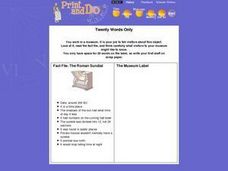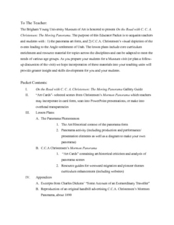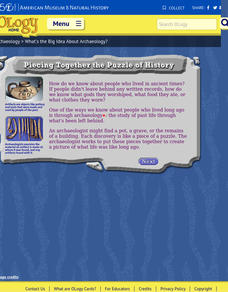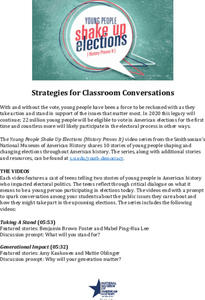Curated OER
The ABC's of Artifacts
Students create their own ABC book about artifacts. In this artifact lesson, students read ABC History Mystery and review the artifacts pictured in the book. They create their own ABC book with each student working on a letter.
Curated OER
Morse Code, Telegraph, and West Virginia
Students prepare for a visit to the West Virginia State Museum. In this West Virginia history lesson, students research the Morse Code and telegraph. Students create their own Morse Code and discuss communication history prior to...
Curated OER
Creating Historians Part Two: The Grab Bag
You don't need to be a museum curator to bring artifacts into the classroom; part two of a series on approaching social studies as a group of historians.
Curated OER
Sedimentary Rocks
Sedimentary rocks are the building blocks of this geology lesson. In it, learners discover what sedimentary rocks are and how they form. They understand the differences between the major sedimentary rock varieties and learn what types of...
Smithsonian Institution
General George Washington, Military Leader
Teach pupils the characteristics that make George Washington such an effective leader, especially in context of his time period. Scholars view artifacts, participate in group work, create lists, compare and contrast, and discuss as a...
Curated OER
Twenty Words Only
In this museum label worksheet, students examine a picture of a Roman sundial artifact and read the information below it. Using 20 words or less, students write a museum label that would tell visitors about this object.
Curated OER
My Museum
In this creative scenario instructional activity, students pretend they are in charge of a local museum. Students view four objects from Viking times and justify which two they plan on putting on display.
Curated OER
The African Burial Ground
Students analyze African American burial grounds. In this African American history lesson, students draw conclusions about African American communities in early New York and consider how archeology made it possible to study the communities.
Curated OER
Harvesting the River Lesson Plan: Taking an Oral History
Students practice researching history through oral traditions. In this U.S. History lesson plan, students examine an online exhibit titled Harvesting the River, in which students interview someone from the story. Students utilize...
Curated OER
Passport To the Past: A Tour of the Ancient, European and Asian Collections
Students study fourteen images of paintings from the Memorial Art Gallery's tour of culture. They study the paintings for artifacts from other cultures and periods of history.
Curated OER
Tapestry in the Middle Ages
Students study the use of tapestry in the daily lives of those living during the Middle Ages. They design and create a weaving of their own detailing artists' use of visual language and symbols throughout history. They write a story that...
Curated OER
A Visit to Manassas Battlefield Park and Museum
Fifth graders gain an appreciation of the battle. They see the perspectives of soldiers from both the North and the South. They choose a side and portray a soldier fighting in a battle or any other time, retelling his thoughts, his...
Curated OER
Origins and Identity
Students examine how to research their family backgrounds. They conduct interviews with various family members, create a family tree, and present their family tree to the class.
Curated OER
The History of The Cyclorama and Moving Panorama
Here is a lesson designed to acquaint learners with two amazing forms of entertainment from the 19th century: The Cyclorama and the Moving Panorama. After seeing what these two contraptions were all about, pupils make their own version...
American Museum of Natural History
What's the Big Idea About Archeology
The American Museum of Natural History offers a website sure to engage young anthropologists. Learners can dig into a site that offers an explanation of the field of archaeology, the kinds of questions archaeologists ask that launch...
US House of Representatives
Exclusion and Empire, 1898–1941
Often forgotten and written off as the model minority, Americans with heritage in Asia and the Pacific Islands have played an essential role in American history, including Congress. Budding historians reclaim history by researching the...
Smithsonian Institution
Young People Shake Up Elections (History Proves It) Educator Guide
Vote, it's your civic duty! The resource provides several videos about voting in the United States. Scholars watch a series of topics ranging from youth participation to civic action. The educator's guide provides teachers with...
NPR
Progressive Era Lesson Plan
The women working for equal rights in the early 20th century weren't a part of one large group; rather, they were members of dozens of small groups focused on social reform. Explore the ways groups in the Progressive Era like National...
Curated OER
Picturing History: John Singleton Copley and British Portraiture
Students observe and compare 18th century British portraits with those made by John Singleton Copley. By conducting research they explore the cultural climate of the portraits in order to write a historically accurate story.
Chicago History Museum
Reading Artifacts
History detectives put their keen observation skills to the test as they closely examine artifacts. Drawing on visual and tactile clues, they formulate a theory about who done it, or in this case who made it, why, and for what purpose...
College Board
2007 AP® English Language and Composition Free-Response Questions Form B
Do museums offer eyes into the past? Scholars synthesize sources to make a claim in an essay about the importance each museum artifact deserves. Pupils also write to analyze journalist level of ethics as well as a speech by Wendell...
National WWII Museum
Rationing by the Numbers: Quantitative Data as Evidence
What was it like to live on wartime rations in the United States during World War II? Young historians find out by exploring how those on the home front bought food thanks to the ration system. Other data includes statistics on car sales...
US House of Representatives
A Growing Diversity, 1993–2017
Connect current events to the roles of AAPI members in Congress. Activities include tracing the impact of the Vietnam War on today's representatives. Learners have various options to explore, including role-play exercises and creating a...
Curated OER
Sailing Through History
Learners research examples of different types of sailing ships, investigating the vessels as well as the politics, economy, and people at the historical time and place the boat was launched. They create displays for a museum exhibit...

























